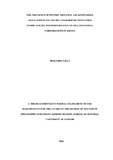| dc.description.abstract | This study was anchored on the proposition that proper utilization of competencies creates proficiencies that build a niche for the firm. The study sought to make a contribution by focusing on how competencies can be crafted by incorporating them with knowledge management and psychic distance in an integrated structure to improve performance of multinational firms. The broad objective of the study was to determine the influence of psychic distance and knowledge management on the relationship between competencies and performance of MNC’s in Kenya. To achieve the objective, five hypotheses were formulated and tested to form the basis of conclusions that were drawn. This study was anchored on the resource based view theory, knowledge based view theory, psychic distance theory and diamond theory of national competitive advantage. The study adopted positivism orientation and a descriptive cross sectional survey was used to find out whether there was a significant association among study variables at a specific point in time. The study population was 104 multinational corporations operating in Kenya. Primary data was collected on a semi- structured questionnaire comprising a five point likert-type scale. Data was analyzed using descriptive and infernal statistics. Relationship between the variables was determined through hypotheses testing. Correlation and multiple regression evaluated the relationship between the variables. Regression analysis was used to predict the unknown value of variables from two or more variables. For reliability tests, Cronbach alpha coefficient was used and constructs with a Cronbach alpha coefficient greater than 0.6 were considered. The study established a significant relationship between firm competencies and performance of MNC’s. Objective two confirmed a significant relationship between knowledge management and firm competencies. The study findings confirmed that knowledge management statistically influenced the relationship between competencies and firm performance hence was considered a moderator in this relationship. Contrary to expectations, the study established that psychic distance as an aggregate did not significantly influence the relationship between knowledge management and firm performance. The results on the joint effect confirmed that the interconnectedness of the study variables significantly influenced performance of multinational corporations. The study has made a unique theoretical contribution by linking the theoretical views into an integrated framework. The findings of this study were consistent with past studies and supported theoretical assertions that sustained competitive advantage cannot be explained by isolated factors. The study concluded that for multinational corporations to enhance their performance they must utilize the competencies that they have, make use of the knowledge they possess and create synchrony between the variables. The current study extends knowledge frontiers in international business arena to cover competencies as a mature discipline that affects multinationals performance. Theoretically, the study increases knowledge in relation to the firm competencies- performance relationship. Policy makers will utilize the study findings to facilitate multinational corporations align to policies that will lead to economic prosperity. The study has a major implication on managerial practice in that managers can realize their organizations full potential by crafting competencies and embracing knowledge management to upsurge improved performance. Firms can also be encouraged to develop strategies consistent with superior performance. The study also discussed concepts in a bid to explore policies that can strengthen linkages between international business research and national objectives. Future studies need to emphasize on other variables that may affect the performance of multinationals either directly or as moderating variables. | en_US |



